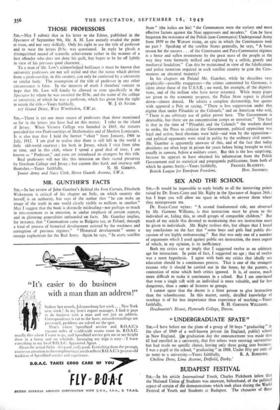MR. GUNTHER'S FACTS
SIR,—In her review of John Gunther's Behind the Iron Curtain, Elizabeth Wiskemann is critical of his chapter on Italy, on which country she herself, is an authority, but says of the author that " he can make an image of the truth in one world clearly visible to millions in another." May I suggest that the book is distinctly misleading—not perhaps so much in mis-statement as in omission, in undue emphasis of certain aspects, and in glittering generalities unfounded on facts. Mr. Gunther implies, for instance, that " Communism came to Bulgaria say, or Poland, through a kind of process of historical development assisted by the weakness and corruption of previous regimes." " Historical development " seems a strange euphemism for the Red Army. Again he says, " In every satellite
State " (the italics are his) " the Communists were the earliest and most effective factors against the Nazi oppressors and invaders." Can he have forgotten the resistance of the Polish (non-Communist) Underground Army from 1939 to the Warsaw rising, an epic in which the Communists took no part ? Speaking of the satellite States generally, he says, "A basic reason for the success ... of the Communist and Para-Communist regimes is a fierce and sullen resentment by the great mass of the people at the way they were formerly milked and exploited by a selfish, greedy and mediaeval feudalism." Can this be maintained in view of the falsifications and police terrorism required in each satellite country to gain the Com- munists an electoral majority?
In his chapters on Poland Mr. Gunther, while he describes very graphically—possibly exaggerates—the crimes committed by Germany, is silent about those of the U.S.S.R. ; no word, for example, of the deporta- tions, and of the million who have never returned. While many pages are given to the economic progress, the Police State aspect is played down—almost denied. He admits a complete dictatorship, but quotes with approval a Pole as saying, " There is less suppression under this regime than under Pilsudski or the Colonels," and an American who said, "There is ,no arbitrary use of police power here. The Government is detestable, but there are no concentration camps or terrorism." The fact is that in the time of " Pilsudski and the Colonels " the workers dared to strike, the Press to criticise the Government, political opposition was legal and active, local elections were held—and won by the opposition— and political opponents were tried in public by the ordinary civil courts. Mr. Gunther is apparently unaware of this, and of the fact that today dissidents are often kept in prison for years before being brought to trial, usually in camera, before a military court. But this is the less surprising, because he appears to have obtained his information from the Polish Government and its statistical and propaganda publications, from both of
which he quotes freely.—Yours faithfully, FRANCES BLACKETT,
British League for European Freedom. Hon. Secretary.


































 Previous page
Previous page